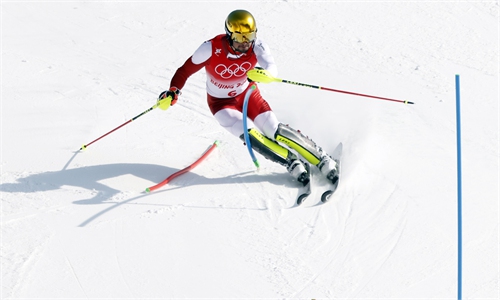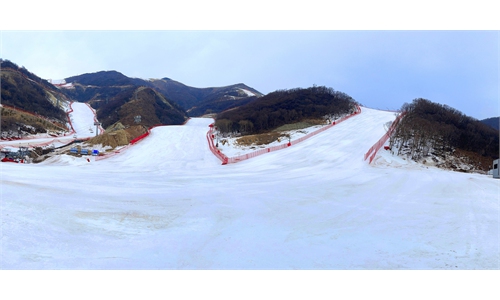High-tech venues, weather-sensitive schedules ensure warmth and safety of athletes at Beijing Winter Games
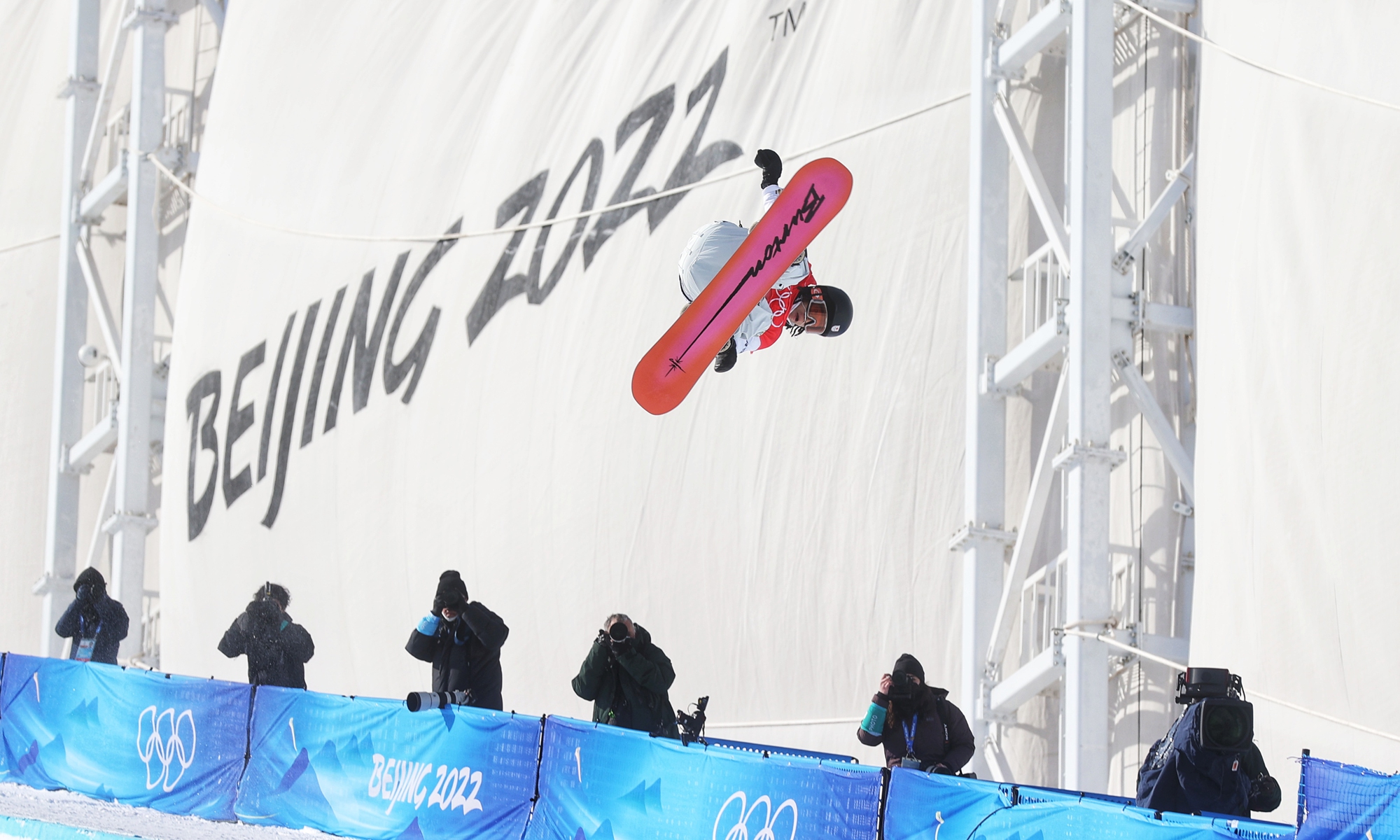
Photo:Cui Meng/GT
Various detailed measures have been made by organizers of the Beijing 2022 Winter Olympic Games on monitoring the weather, offering warm-up venues and logistics support to ensure the safety of athletes and smooth races especially in possible extreme weather. However, criticizing the Beijing Olympics for being "too cold" has become a new topic for some Western media to attack China, a move that has been criticized by experts and overseas netizens for not only lacking integrity but also showing a new low of the media.
Beijing and Zhangjiakou, where snowboarding, ski jumping, biathlon, cross country and other events of the Olympics are held, may embrace temperature drops and a wide range of snow in the upcoming weekend, according to a weather forecast on Friday.
In response to possible temperature drops in the coming weekend, Zhao Weidong, head of the Media and Communications Organizing Committee for Beijing 2022 Winter Games, told a press conference on Friday that multiple measures have been implemented to ensure the Games in extreme weather conditions, and noted that the weather monitoring system in Yanqing and Zhangjiakou could offer an accurate forecast.
Recently, some Western media, including the BBC, the Guardian and the Washington Post hyped the cold weather of the Beijing Olympics by citing some athletes as saying that they are living and training in dismal conditions and were lobbying organizers for improvement. These reports also claimed that the cold weather and strong wind in Zhangjiakou had collapsed some athletes.
However, the Global Times learned from different sources and experts on winter sports that the weather conditions for the Beijing Games are not as cold as other Olympics and the organizers have made considerable measures and are prepared for extreme weather.
A source from the Olympic Village familiar with the organizing procedure told the Global Times on Friday that the temperature drop this weekend may not be below minus 20 degrees Celsius and we have various services - on technology, on venues and a series of procedures - to ensure the competitions.
Under the International Ski Federation, or FIS rules, competitions are stopped from taking place when temperatures are below minus 4 degrees Fahrenheit, which is minus 20 C.
"The Beijing Olympics will abide by these regulations. Postponing some races were normal in previous Winter Olympics due to weather conditions. Coldness is a characteristic of Winter Olympics as it is held in winter. The adaptation to the weather and nature is the charm of the Games and also represents the Olympic spirit," said the source.
During the Pyeongchang Olympics in 2018, most of the first week of competition was postponed because of howling winds.
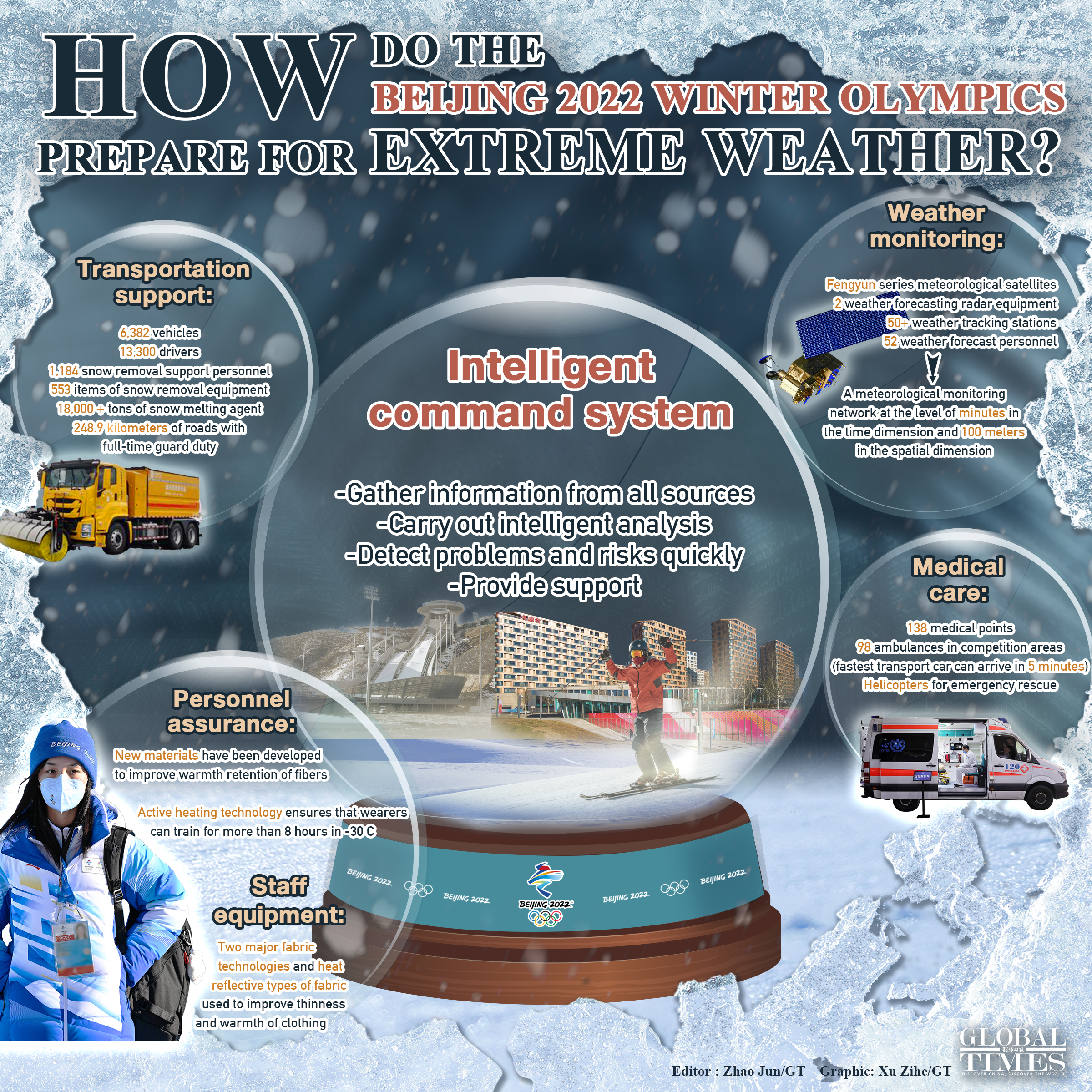
Editor: Zhao Jun/GT Graphic: Xu Zihe/GT
To keep athletes warm and ensure the races, the organizers of the Beijing Olympics have offered various services. The source said that every venue offers detailed information on weather, including wind speed, temperature, wind direction and humidity, to athletes and their teams for them to arrange training and preparations for the races.
The organizers also set indoor and outdoor sites for athletes to warm up with various facilities and hot drinks have been offered in the venues to help athletes restore their body temperatures as soon as possible, said the source.
High technologies have been applied to the construction of facilities in the venues.
For example, the Global Times learned from the Beijing Institute of Radio Measurement (BIRM) under the state-owned high-tech giant China Aerospace Science and Industry Corp (CASIC) that Chinese scientists are offering their radar expertise to support the ongoing Beijing Games in weather monitoring and forecasting, which are essential especially for outdoor competitions on the snow.
New materials and technologies were also used in the buildings and temporary facilities. For example, new insulation materials were planted like capillaries inside the walls to warm the building, making it comfortable and energy-saving, the Beijing Youth Daily reported.
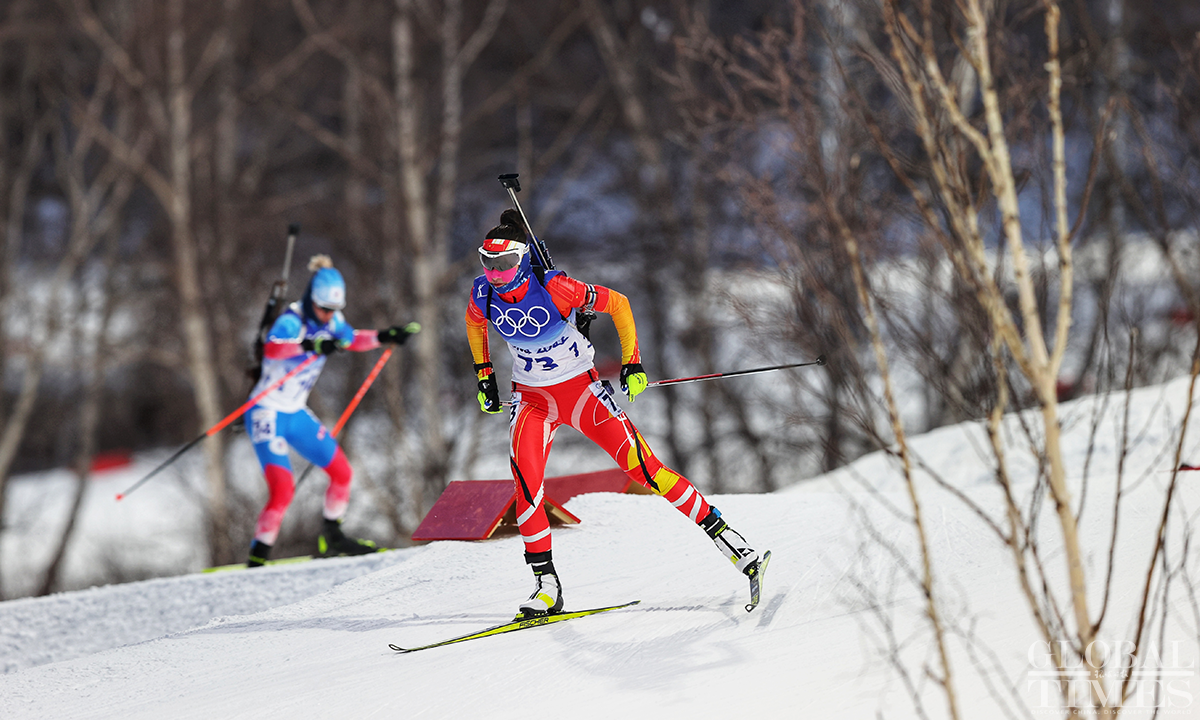
Chu Yuanmeng, Meng Fanqi, Tang Jialin and Ding Yuhuan finished 35th, 47th, 59th and 81st respectively in the women's 15km individual biathlon held at the National Biathlon Center on February 7, 2022 in Zhangjiakou, China. Photo: Cui Meng/GT
The organizers will also adjust in accordance with the weather. Take the schedule for cross-skiing. The races have been arranged between 10 am and 4 pm when the temperature is higher to ensure athletes can have better performances during the races, said the source.
The accurate weather report also helps organizers adjust races in accordance with new conditions. The Global Times learned from CASIC that race director Markus Waldner spoke highly of the professional and precise meteorological services in the Yanqing competition zone.
The men's downhill at the Winter Olympics, which was originally set at 11 am on Sunday, was postponed to Monday at noon due to high winds. During the delay, the weather forecast team studied the changes in wind speed hour by hour, and reported these weather conditions promptly.
A report from the Insider on February 7 said that Sweden's cross-country ski team is considering asking the International Ski Federation to start races at the Beijing Winter Olympics earlier in the day to try to protect athletes from the freezing temperatures.
However, in response to the Global Times' inquiry on the issue on Friday, FIS said in an email that FIS has not received any request to change the start times.
"Should any event need to be changed from its originally scheduled time, a committee made up of representatives from BOCOG [Beijing Organizing Committee for the 2022 Olympic and Paralympic Winter Games], the IOC [International Olympic Committee], FIS and OBS [Olympic Broadcasting Services] would meet to check the feasibility of changing the start time. But again, no request has been submitted and such changes are generally only made in inclement weather," according to the FIS.
The source also noted that timely cleaning the snow and ice cover on the racetrack and designating wind-proof areas aside skiing tracks could also help keep athletes and working staff warm, said the source.
The Global Times reporter in Zhangjiakou witnessed the women's ski jump race on February 5 and took a glance at the logistical support of the organizers. Before the race, the athletes needed to wait for a green signal from down the track. There was a screen to show real-time information of wind speed and direction to ensure their safety.
Athletes did not need to wait long before jumping and if the weather was not suitable, they were asked to withdraw. Aside from race and warm-up time, athletes had been taken good care of by the team and they could wear more clothes to keep warm. Their suits for competition are also made of high-end materials or contain advanced technologies of their country to keep them warm and comfortable, the Global Times learned.
From athletes to their team members as well as the audience who danced under the guidance of volunteers to keep warm seemed to enjoy the races.
Analysts reached by the Global Times said that Beijing is an ideal place to hold the Winter Olympic Games since the average temperature is suitable for organizing winter sports and the mountains and large stadiums are good choices to have alpine skiing and indoor winter sports.
Following some Western media hype of the "coldness" in the Beijing Olympics, some netizens said that they have showed a new low in order to attack China. Tom Fowdy, a British political and international relations analyst, tweeted on February 8 that "Complaining about the cold during the Winter Olympic Games? This truly shows how utterly pathetic the coverage is."
Another netizen named Kamatron commented on the Guardian report about the "cold" of the Games, saying that "This is getting more surreal by the day," and added he is seriously concerned about the reporter's integrity.


